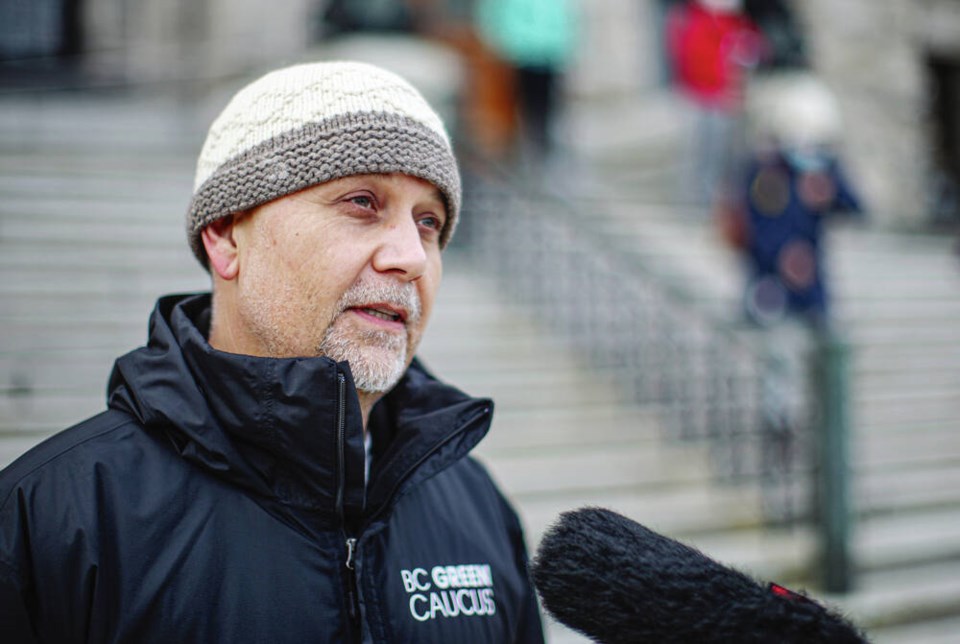Looking a gift horse in the mouth is never recommended, but opposition critics are doing just that and finding all sorts of objections to how the NDP is rushing 2.7 billion last-minute dollars out the door.
Even as they do so, they are acknowledging how warmly the spending spree is being received — at least among the groups that were favoured with whopping funding hikes.
“I recognize that it’s going to be overwhelmingly accepted … people will be pleased,” said Green MLA Adam Olsen. “They’ll be happy to get it.”
He was referring specifically to the NDP’s plans to spend $1.5 billion through the Municipal Affairs Ministry by way of three separate spends.
A billion dollars was handed over to municipalities last month to spend as they see fit, another $450 million was allocated for critical infrastructure improvements, and $45 million was added to support public libraries.
The billion dollars has already been handed out in amounts ranging from $619,000 (Lytton) to Â鶹´«Ã½Ó³»($49 million) to much rejoicing from local councils.
So what’s not to love?
The fact that the massive surplus that fuels the spending spree is a one-off, almost certainly a once-in-a-lifetime phenomenon, raises questions about whether it should be have been spread out over time, rather spent all at once.
Citing the years that officials have spent trying to design a more sustainable funding model for local governments, Olsen questioned whether any thought was given to using the windfall for long-term sustainability and resilience.
He described the history of provincial revenue-sharing as “a hit of cash now and then a desert, a hit of cash and a desert.”
Municipal Affairs Minister Anne Kang acknowledged the surplus is unlikely to ever happen again. The money is being sent out immediately but towns have five years in which to spend it, she said.
The spending of the surplus is divided among 11 ministries and questions are popping up as each minister defends the plans for the bonus.
Earlier, Transportation and Infrastructure Minister Rob Fleming outlined how a half-billion dollars in new money suddenly materialized for his ministry. He indicated that Premier David Eby specified it was to minimize fare hikes at B.C. Ferries, as opposed to general ministry works.
Similarly, Water Land and Resource Stewardship Minister Nathan Cullen acknowledged that Eby and Finance Minister Katrine Conroy determined that his $100 million in bonus revenue would be spent on a unique new watershed security fund.
“The decision to allow the funds to go towards the watershed security fund wasn’t my decision. It was cabinet’s decision. As such, it is confidential with respect to when and how that decision was arrived at,” he said.
He referred detailed questions about the decision to the minister of finance and the premier.
The water fund has a longer-range view than the municipal grants. Cullen said it is one-time funding but is designed to grow over time so work can continue year after year.
But again, on the decisions and priorities, he said “that was made by the minister of finance in consultation with the premier, questions are best laid to her.”
B.C. Liberal critic Lorne Doerkson expressed surprise that such a large sum is going to be deposited “into a fund that isn’t developed yet.”
It is another indication of how quickly this additional spending in the last month of the fiscal year was thrown together.
Cullen has just three weeks to find a financial partner to administer the fund and said the B.C. Real Estate Foundation, with a track record in that field, is the likely candidate.
Elsewhere, an extra $111 million has been loaded into the Agriculture Ministry — more than doubling its budget.
It will be sent on to two independent agencies, one of them Indigenous, to promote food security. But details are scant.
Protesting the vagueness of Agriculture Minister Pam Alexis’s explanation, Liberal critic Mike de Jong summed up the situation with imaginary dialogue.
“How are you going to spend it?”
“We’re going to give it to some agencies we have no real control over.”
“How much are you going to give them?”
“I’m not going to tell you.”
“But it’s our money. We’re the taxpayers.”
“I’m still not going to tell you.”
The intentions are all motherhood and apple pie. Protect water, help taxpayers, do good works all over. But the how, the when and the where are all up in the air.
>>> To comment on this article, write a letter to the editor: [email protected]

